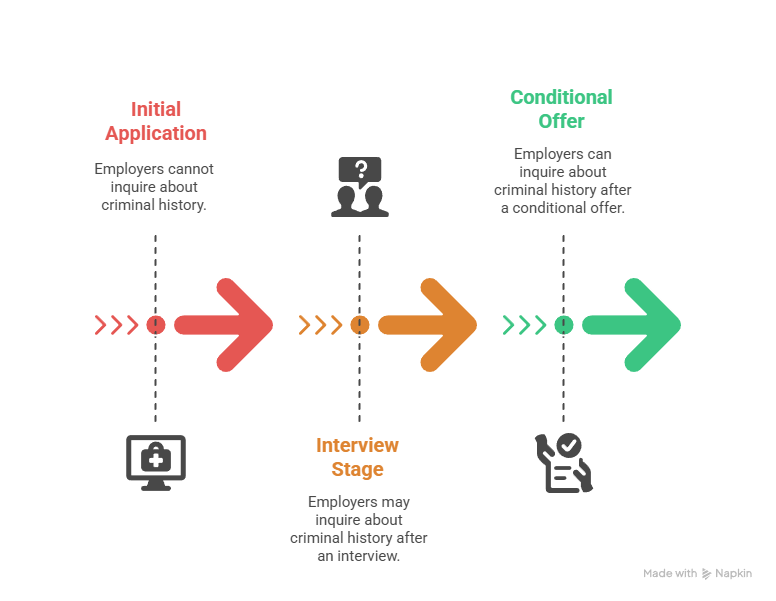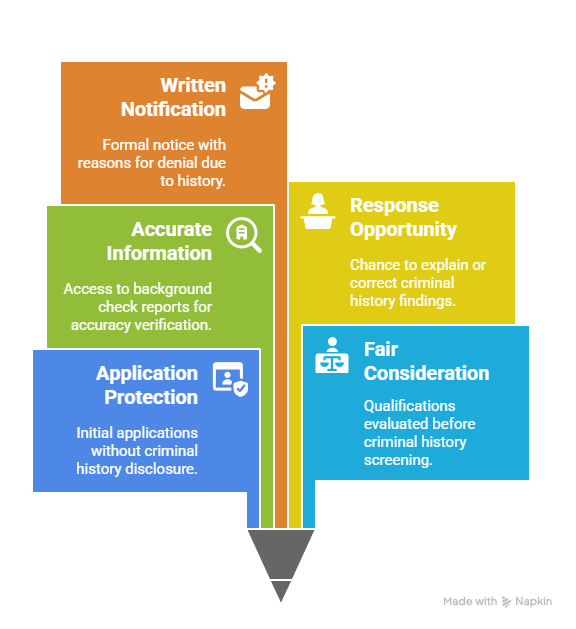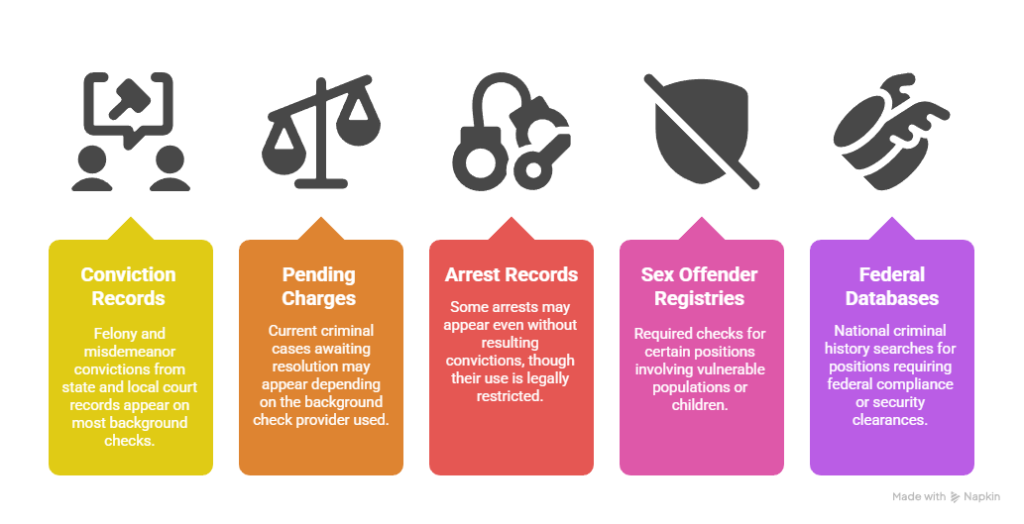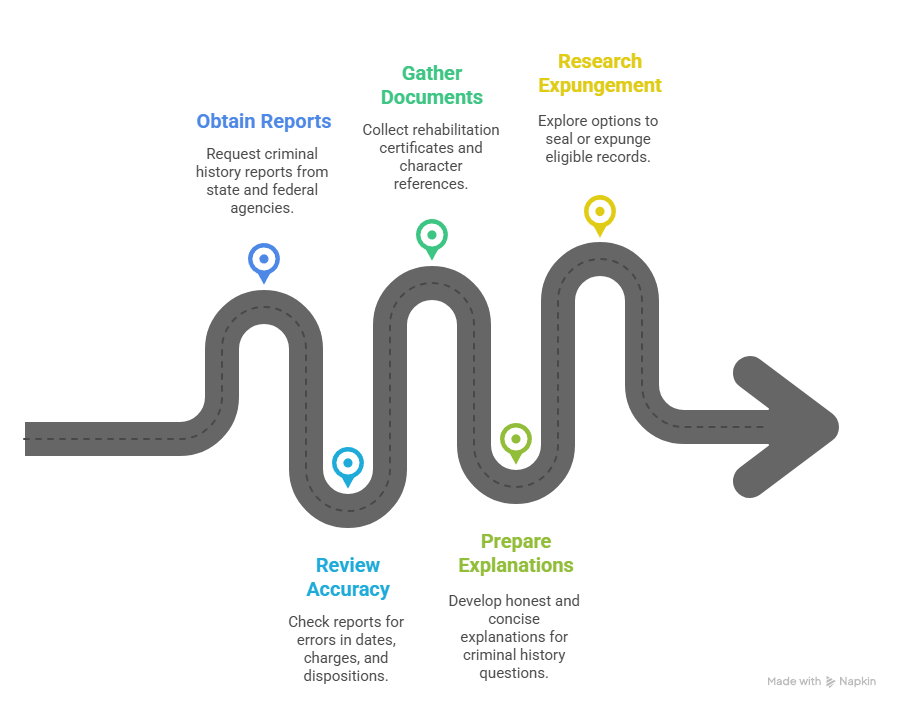Pennsylvania's ban-the-box legislation restricts when employers can inquire about criminal history during the hiring process. This law provides job seekers with criminal records better opportunities for employment consideration by requiring employers to delay background check questions until after the initial application phase.
Key Takeaways
- Pennsylvania's ban-the-box law prohibits employers from asking about criminal history on initial job applications
- The law applies to most private employers with 15 or more employees and all public sector positions
- Employers must wait until after the first interview or conditional job offer before conducting background checks
- Certain industries and positions are exempt from Pennsylvania's ban-the-box requirements
- Job seekers have specific rights regarding criminal history disclosure and can challenge unfair hiring decisions
- Understanding these protections helps applicants navigate the employment process more effectively
Understanding Pennsylvania's Ban-the-Box Law
Pennsylvania enacted its ban-the-box legislation to reduce employment barriers for individuals with criminal records. The law fundamentally changes how employers approach background screening during the hiring process. This legislation does not eliminate background checks entirely. Instead, it focuses on timing and procedural fairness.
The Pennsylvania ban-the-box law represents a significant shift toward fair chance hiring practices. This approach allows job seekers to demonstrate their qualifications first. Criminal history becomes a factor only later in the process. The legislation aims to reduce recidivism by improving employment opportunities. It specifically targets helping formerly incarcerated individuals find work.
Fair chance hiring has proven benefits for both workers and employers. Studies show that employees with criminal records often demonstrate high loyalty and strong work ethics. They also have lower turnover rates compared to other workers. Pennsylvania recognized these benefits when crafting its ban-the-box law.
The law creates a more equitable hiring process across the state. It prevents automatic disqualification based on criminal history alone. Instead, employers must consider the whole person and their qualifications. This balanced approach helps reduce discrimination while maintaining employer flexibility.
Legislative Background and Purpose
Pennsylvania's ban-the-box law emerged from growing recognition of employment barriers. Criminal history questions on job applications create substantial obstacles for job seekers. Research consistently shows that individuals with criminal records face significant challenges securing employment. These challenges contribute to higher recidivism rates in communities.
The law reflects a broader national movement toward criminal justice reform. Pennsylvania joined numerous other states in recognizing unfair screening practices. Early criminal history screening often prevents qualified candidates from receiving fair consideration. This policy shift acknowledges that people can change and contribute positively to society after serving their sentences.
Who Must Comply with Pennsylvania's Ban-the-Box Requirements
Pennsylvania's ban-the-box law applies to specific categories of employers. The requirements are based on employer size and sector type. Private employers with 15 or more employees must comply with these requirements. All public sector employers fall under the law's jurisdiction regardless of size.
The employee count includes all workers, both full-time and part-time. Employers must count their total workforce across all locations within Pennsylvania. This calculation determines whether they fall under the law's requirements. Seasonal fluctuations in employee numbers may affect compliance obligations.
| Employer Type | Employee Threshold | Compliance Required |
| Private Companies | 15+ employees | Yes |
| Public Agencies | All sizes | Yes |
| Small Private Businesses | Under 15 employees | No |
The law's coverage ensures that most Pennsylvania job seekers benefit from these protections. However, small businesses with fewer than 15 employees remain exempt from compliance requirements. This exemption recognizes the different operational challenges faced by smaller employers.
Public sector compliance includes state agencies, municipal governments, and school districts. These employers must follow ban-the-box requirements regardless of their size. The public sector often sets the standard for fair employment practices in communities.
Exemptions and Special Circumstances
Certain positions and industries maintain exemptions from Pennsylvania's ban-the-box law. These exemptions exist due to safety or regulatory considerations. They recognize that some roles require immediate criminal history screening. Public safety or legal compliance reasons justify these exceptions.
The exemptions balance fair hiring practices with legitimate safety requirements. Employers in exempt sectors can continue asking about criminal history on initial applications. However, they must still follow other applicable employment discrimination laws.
Exempt positions include:
- Law enforcement roles: Police officers, corrections staff, and security positions requiring state certification must undergo immediate background screening
- Healthcare positions: Jobs involving patient care, controlled substances, or vulnerable populations need early criminal history review for safety reasons
- Financial services: Roles with access to money, financial accounts, or sensitive financial information require immediate screening due to federal regulations
- Childcare and education: Positions involving direct contact with minors or vulnerable adults must prioritize safety through early background checks
- Transportation: Commercial driving positions and roles requiring DOT clearances need immediate screening for public safety compliance
Federal law often mandates these exemptions for specific industries. State ban-the-box laws cannot override federal background check requirements. Employers must comply with the most restrictive applicable law.
Timeline and Process Requirements for Background Checks
Pennsylvania's ban-the-box law establishes specific timing requirements for criminal history inquiries. The law prohibits criminal history questions during the initial application phase. This creates a fairer screening process for all applicants. Employers must wait until after the first interview or before making a conditional job offer.
The initial application phase includes online applications, paper forms, and preliminary screenings. During this stage, employers cannot ask any questions about criminal history. They also cannot require disclosure of arrests, convictions, or pending charges. This restriction applies to both written questions and verbal inquiries.
The legislation allows employers flexibility in when they conduct background checks after the initial phase. Some companies choose to screen after first interviews. Others wait until extending conditional offers. This timing flexibility helps employers balance their screening needs with legal compliance requirements.
Employers must clearly separate their hiring process into distinct phases. The initial application phase focuses solely on qualifications, experience, and skills. The background screening phase comes later in the process. This separation ensures compliance with ban-the-box requirements.
Permitted Inquiry Timeline
The ban-the-box law creates a structured timeline for criminal history inquiries. Each phase has specific requirements and restrictions. Understanding this timeline helps both employers and job seekers navigate the process correctly.

Phase 1 - Initial Application: Employers cannot ask about criminal history, arrests, or convictions. This restriction applies to job applications and initial screening processes. Verbal inquiries during initial contact are also prohibited.
Phase 2 - Interview Stage: After completing at least one interview, employers may begin inquiring about criminal history. They can also start conducting background checks at this stage. The interview must be substantive and focus on job qualifications.
Phase 3 - Conditional Offer: Alternatively, employers can wait until extending a conditional job offer. This approach provides maximum protection for job seekers. It ensures thorough evaluation of qualifications before criminal history screening occurs.
This phased approach protects job seekers while providing employers necessary information. The timeline ensures candidates can showcase their qualifications first. Criminal history screening occurs only after demonstrating job-related competencies.
Your Rights as a Job Seeker Under Pennsylvania's Ban-the-Box Law
Job seekers in Pennsylvania gain important protections under the ban-the-box law. These protections relate to criminal history disclosure and background check processes. You have the right to apply for positions without immediately disclosing criminal history information. Employers cannot reject your application based solely on premature criminal history questions.
The law protects you during the initial application phase completely. You can focus on presenting your qualifications, skills, and experience. Criminal history cannot be a factor during this early screening stage. This protection gives you a fair chance to make a positive first impression.
When employers conduct background checks later, they must follow specific procedures. They cannot make automatic decisions based on criminal history findings alone. Instead, they must conduct individualized assessments of each situation. This requirement protects you from blanket discrimination policies.
If an employer plans to deny employment based on criminal history findings, specific procedures apply. They must provide written notification of their intent to deny employment. You then have time to respond with explanations or corrections. This process ensures accuracy and fairness in hiring decisions.
Your specific rights include:

- Application protection: Apply without criminal history disclosure on initial applications, allowing you to present qualifications first
- Fair consideration: Have qualifications evaluated before criminal history screening occurs during the hiring process
- Accurate information: Receive copies of background check reports used in hiring decisions to verify accuracy
- Response opportunity: Provide explanations or corrections regarding criminal history findings before final decisions
- Written notification: Receive formal notice if denied employment due to criminal history with specific reasons
Understanding these rights helps you navigate the hiring process more effectively. It also ensures employers follow proper legal procedures during their decision-making process.
Challenging Unfair Hiring Decisions
If you believe an employer violated Pennsylvania's ban-the-box law, you have options for challenging their decision. Document any violations carefully, such as criminal history questions on applications. Also record premature background check inquiries that occur too early in the process. Keep records of all communications and application materials for potential legal proceedings.
You can file complaints with the Pennsylvania Human Relations Commission for violations. You may also pursue legal action through employment attorneys specializing in discrimination cases. These enforcement mechanisms help ensure employers comply with ban-the-box requirements and protect your employment rights.
Background Check Process and Disclosure Requirements
Pennsylvania's ban-the-box law regulates when and how employers conduct criminal history screening. The law does not eliminate background checks entirely. Instead, it ensures proper timing and procedural fairness throughout the screening process. Once the appropriate timing threshold is met, employers can request comprehensive background check information.
The background check process must include proper notification to job candidates. Employers must inform you before conducting criminal history screening. They must also provide opportunities for response before final hiring decisions. You have the right to see what information influences their decision-making process.
Employers cannot automatically disqualify candidates based on criminal history without proper consideration. They must consider factors like job relevance, time elapsed since conviction, and evidence of rehabilitation. This individualized assessment requirement promotes fairer hiring practices across all industries.
The law requires transparency throughout the background screening process. Employers must explain their decision-making criteria clearly. They must also provide written documentation of their reasoning when criminal history affects hiring decisions. This transparency protects both employer interests and candidate rights.
| Background Check Stage | Employer Requirements | Candidate Rights |
| Pre-Screen Notice | Inform about upcoming check | Review disclosure forms |
| Report Receipt | Provide copy to candidate | Challenge inaccuracies |
| Adverse Decision | Written explanation required | Response opportunity |
These procedural safeguards ensure fairness throughout the entire background screening process. They create accountability for employer decision-making while protecting candidate rights.
Types of Criminal History Information
Background checks under Pennsylvania law may include various types of criminal history information. The scope depends on the position and employer requirements. Understanding what information appears on these reports helps you prepare for potential employer questions or concerns.
Typical background check components:

- Conviction records: Felony and misdemeanor convictions from state and local court records appear on most background checks
- Pending charges: Current criminal cases awaiting resolution may appear depending on the background check provider used
- Arrest records: Some arrests may appear even without resulting convictions, though their use is legally restricted
- Sex offender registries: Required checks for certain positions involving vulnerable populations or children
- Federal databases: National criminal history searches for positions requiring federal compliance or security clearances
The scope of background screening varies significantly by position type and employer policies. Higher-security positions typically require more comprehensive criminal history reviews.
Industry-Specific Considerations and Variations
Different industries in Pennsylvania may have varying approaches to implementing ban-the-box requirements. They must balance state law compliance with federal regulations and industry standards. Healthcare, financial services, and transportation sectors often have additional background screening requirements. These requirements exist beyond state ban-the-box laws.
Some industries maintain federal background check requirements that supersede state protections. These federal requirements typically apply to roles involving national security concerns. They also affect positions involving transportation safety or financial institution access. Job seekers should research industry-specific screening practices when applying for positions in regulated sectors.
Federal law creates a complex landscape of background screening requirements. Some federal requirements mandate immediate criminal history screening. These requirements can override state ban-the-box protections for specific positions. Understanding this interaction helps job seekers set appropriate expectations during their application processes.
Industry associations often provide guidance on implementing ban-the-box requirements. They help employers balance compliance with operational needs. This guidance ensures consistent application of the law across different sectors.
Industry considerations include:
- Healthcare: Patient safety requirements and controlled substance access necessitate thorough background screening for many positions
- Education: Child protection screening and state certification requirements often require immediate criminal history review
- Financial services: FDIC and federal banking regulation compliance mandates early background screening for many roles
- Transportation: DOT safety requirements and commercial licensing create immediate screening needs for safety-sensitive positions
- Government contractors: Security clearance and federal compliance needs often require comprehensive immediate background checks
These industry variations do not eliminate ban-the-box protections entirely. However, they may create additional screening requirements for specific positions within these sectors.
Federal vs. State Requirements
The interaction between federal and state background screening requirements can be complex. Federal law generally takes precedence when there are conflicts with state requirements. This means that federally mandated background checks can override ban-the-box protections. Job seekers should understand how these different requirements affect their specific situation.
Federal requirements often apply to positions involving interstate commerce, banking, or transportation. They also affect roles requiring security clearances or access to sensitive facilities. These positions may require immediate criminal history screening regardless of state ban-the-box laws.
Preparing for Employment Screening Under Pennsylvania Law
Job seekers with criminal records can take proactive steps to prepare for employment screening. Preparation helps you navigate Pennsylvania's ban-the-box law requirements successfully. Obtaining copies of your own criminal history reports helps you understand what employers will see. This preparation allows you to address potential concerns honestly and proactively.
Understanding your criminal history record is crucial for successful job searching. You should know exactly what appears on background checks before employers see it. This knowledge helps you prepare accurate explanations and identify any errors that need correction.
Consider developing a brief, honest explanation of your criminal history. Focus on rehabilitation and personal growth since your conviction. Practice discussing your background in a professional manner. Acknowledge past mistakes while emphasizing current qualifications and reliability. Many employers appreciate honesty and evidence of positive change when making hiring decisions.
Preparation also involves understanding the specific requirements of your target industry. Different industries have different screening standards and expectations. Research these requirements to set appropriate expectations for your job search process.
Your preparation should include gathering supporting documentation. Character references, training certificates, and rehabilitation program completions can strengthen your application. These documents demonstrate positive changes since your conviction occurred.
Documentation and Record Preparation
Thorough preparation involves gathering and organizing important documentation. This documentation helps you present your background in the most favorable light possible. It also demonstrates responsibility and proactive behavior to potential employers.
Essential preparation steps:

- Obtain criminal history reports: Request copies from state and federal agencies to know exactly what employers will see
- Review for accuracy: Check dates, charges, and dispositions for errors that could negatively impact your job search
- Gather supporting documents: Collect rehabilitation certificates, character references, and training completion records that demonstrate positive change
- Prepare explanations: Develop honest, concise explanations for criminal history questions that focus on growth and rehabilitation
- Research expungement options: Explore opportunities to seal or expunge eligible records to reduce their impact on employment
This preparation demonstrates responsibility to potential employers. It also helps you present your background truthfully while emphasizing positive changes and current qualifications.
Best Practices for Job Seekers During the Application Process
Successfully navigating Pennsylvania's ban-the-box law requires a strategic approach to job applications. Focus on highlighting your qualifications, skills, and experience during the initial application phase. Use this protected time to make the strongest possible impression on potential employers. Your goal is to demonstrate value before criminal history becomes part of the conversation.
Tailor your application materials to each specific position and employer. Highlight relevant experience and accomplishments that directly relate to the job requirements. Use concrete examples and quantifiable achievements when possible. This approach helps employers see your potential contribution to their organization.
Network within your industry and community to identify job opportunities. Personal connections often lead to better employment outcomes for individuals with criminal records. Networking allows you to build relationships before background screening occurs. These relationships can provide valuable support during the hiring process.
Be prepared to discuss your criminal history honestly when the time comes. Practice explaining your situation in a way that takes responsibility while emphasizing growth. Focus on what you learned from your experience and how you have changed. Employers respect honesty and evidence of personal development.
Consider working with reentry employment services or career counselors. These professionals understand the unique challenges faced by individuals with criminal records. They can provide valuable guidance on job search strategies and interview preparation.
Timing Your Job Search Strategy
Strategic timing can improve your job search success under Pennsylvania's ban-the-box law. Plan your applications carefully to maximize the benefits of the protected initial phase. Submit applications when you can follow up promptly and maintain momentum throughout the process.
Consider seasonal hiring patterns in your target industry. Some sectors have predictable busy periods when they hire more actively. Timing your job search to coincide with these periods can increase your opportunities for success.
Common Misconceptions About Pennsylvania's Ban-the-Box Law
Many job seekers hold misconceptions about Pennsylvania's ban-the-box law that can affect their job search strategy. One common misconception is that the law prohibits all background checks. In reality, the law only regulates the timing of criminal history inquiries. Employers can still conduct comprehensive background checks after the appropriate stage in the hiring process.
Another misconception is that ban-the-box laws guarantee employment for individuals with criminal records. The law creates fairer processes but does not ensure job offers. Employers can still consider criminal history in their final hiring decisions. However, they must conduct individualized assessments rather than automatic disqualifications.
Some job seekers believe that ban-the-box laws apply to all employers equally. Pennsylvania's law has specific coverage requirements and exemptions. Understanding these limitations helps set realistic expectations during your job search. Not all employers or positions fall under the law's protection.
There is also confusion about when criminal history can be discussed during the hiring process. Some job seekers believe they never have to disclose their criminal history. The law delays these discussions but does not eliminate them entirely. Honesty remains important once the appropriate stage is reached.
Job seekers sometimes assume that ban-the-box laws override all other background check requirements. Federal laws and industry regulations can still require immediate criminal history screening. These requirements can supersede state ban-the-box protections for specific positions.
Clarifying Legal Protections and Limitations
Understanding the actual scope of Pennsylvania's ban-the-box law helps set appropriate expectations. The law provides important protections but has specific limitations. Knowing both the protections and limitations helps you navigate the job search process more effectively.
The law protects against premature criminal history inquiries but allows them at appropriate times. It requires individualized assessments but does not prohibit considering criminal history in hiring decisions. These distinctions are important for understanding your actual legal protections.
Conclusion
Pennsylvania's ban-the-box law provides important protections for job seekers with criminal records by delaying background check inquiries until after initial application screening. Understanding your rights under this legislation helps you navigate the hiring process more effectively and ensures employers follow proper procedures. While the law does not guarantee employment, it creates fairer opportunities for demonstrating your qualifications before criminal history becomes a factor. Preparing thoroughly for background screening discussions and knowing your legal protections empowers you to pursue employment opportunities with greater confidence and success.
Frequently Asked Questions
When can employers ask about criminal history under Pennsylvania's ban-the-box law?
Employers must wait until after conducting at least one interview or before extending a conditional job offer before inquiring about criminal history or conducting background checks.
Does Pennsylvania's ban-the-box law apply to all employers?
The law applies to private employers with 15 or more employees and all public sector employers, regardless of size. Small private businesses with fewer than 15 employees are exempt.
Can employers still conduct background checks under Pennsylvania's ban-the-box law?
Yes, employers can still conduct comprehensive background checks, but they must wait until the appropriate stage in the hiring process and follow specific procedural requirements.
What jobs are exempt from Pennsylvania's ban-the-box requirements?
Positions in law enforcement, healthcare, financial services, childcare, education, and transportation often have exemptions due to safety or regulatory requirements.
What should I do if an employer asks about criminal history on a job application?
If the employer is covered by Pennsylvania's ban-the-box law, you can inform them of the legal requirements or file a complaint with the Pennsylvania Human Relations Commission.
Can I be automatically rejected for employment due to a criminal record in Pennsylvania?
No, employers must conduct individualized assessments considering factors like job relevance, time elapsed, and evidence of rehabilitation before making hiring decisions based on criminal history.
Additional Resources
- Pennsylvania Human Relations Commission - Ban-the-Box Guidance
https://www.phrc.pa.gov - National Employment Law Project - Ban-the-Box Resources
https://www.nelp.org - Pennsylvania Department of Labor & Industry - Employment Rights
https://www.dli.pa.gov - Legal Aid Organizations - Criminal Record Expungement Services
https://www.palegalaid.net - Reentry Employment Services - Job Search Assistance
https://www.reentryservices.org

GCheck Editorial Team
Meet the GCheck Editorial Team, your trusted source for insightful and up-to-date information in the world of employment background checks. Committed to delivering the latest trends, best practices, and industry insights, our team is dedicated to keeping you informed.
With a passion for ensuring accuracy, compliance, and efficiency in background screening, we are your go-to experts in the field. Stay tuned for our comprehensive articles, guides, and analysis, designed to empower businesses and individuals with the knowledge they need to make informed decisions.
At GCheck, we're here to guide you through the complexities of background checks, every step of the way.






